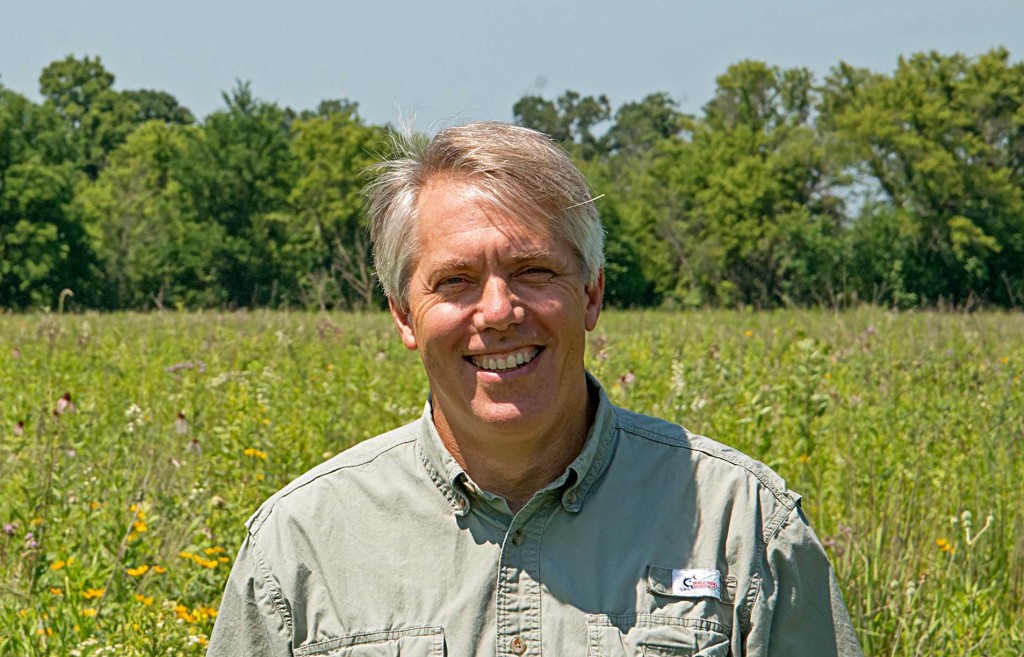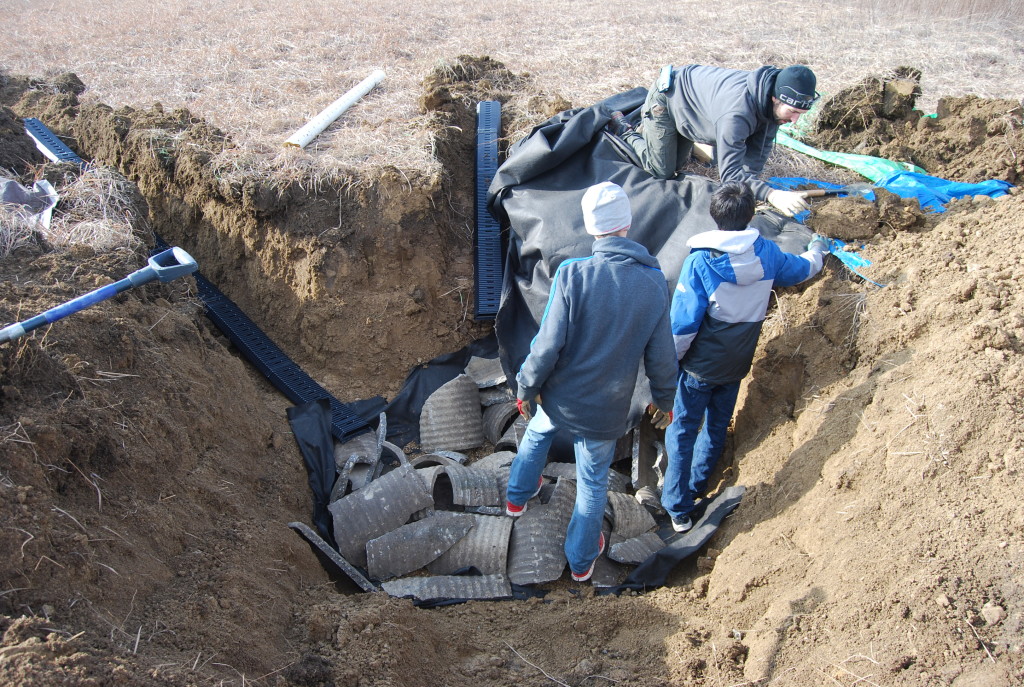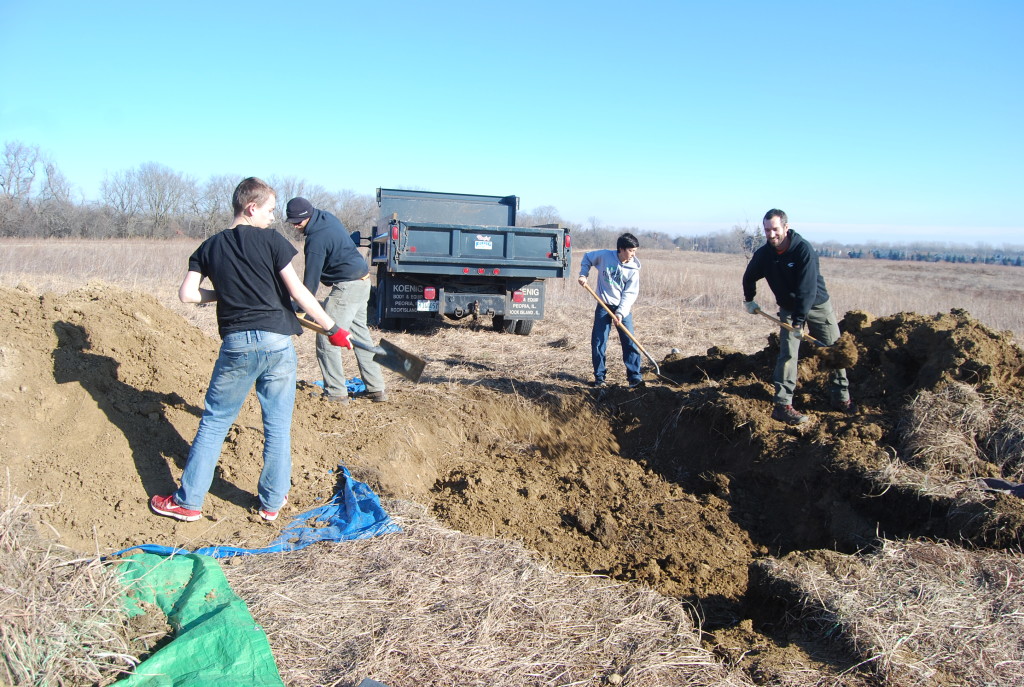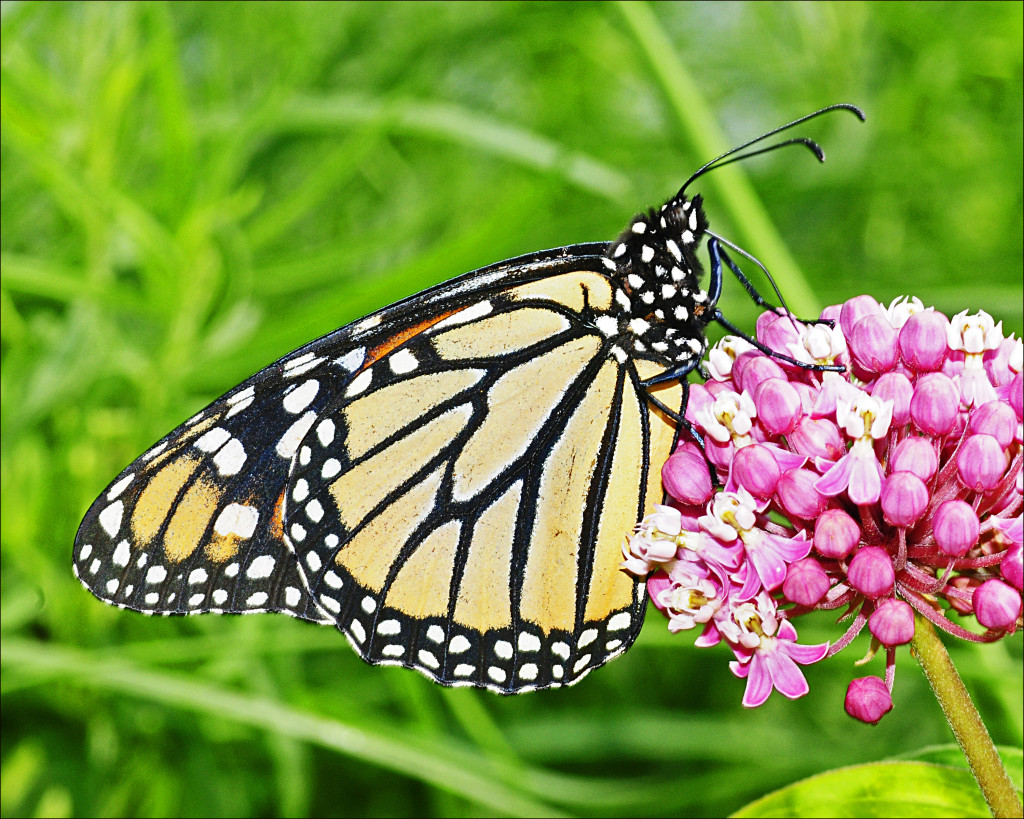Steve Barg is an example of a Christian working to protect and renew God’s earth through a career in land conservation. I worked for Steve for ten years when he was the executive director of Conserve Lake County, a non-profit organization based in Grayslake, Illinois. He had come to that position after using his gifts as an environmental educator for the Park District of Highland Park as well as for Lake Forest Open Lands. Steve is a dear friend who has a contagious enthusiasm for the beauty of the living world around us, particularly for birds. He and his wife Susan now live in Elizabeth, Illinois, in Jo Daviess County, which is at the northwest corner of the Prairie State.
Nathan: Can you tell me about your current profession and the kinds of projects you and your organization area currently working on?
Steve: I serve as executive director of the Jo Daviess Conservation Foundation (JDCF). JDCF’s mission is to preserve land for the lasting well-being of people and wildlife. This includes protecting high quality wildlife habitat for rare species, scenic overlooks, working lands and Native American Heritage sites and providing public access to these sites. We have a staff of 10, eight full-time and two part-time. It’s interesting – there’s no local government entity that preserves open land and make it available to the public. So, as a non-profit, we serve a unique and valuable role for the county in terms of acquisition, creating access, and opening the preserves to the public.
But we also do a lot more. We also rally communities around conservation projects and engaging people on the land and with the land. One example is the Wapello Preserve in Hanover. Hanover’s a town of 800 that is suffering and depressed like a lot of small towns in Middle America. They were, as a community, dead set against us coming in and purchasing land. They didn’t know who we were and what we did. I wasn’t there at the time, but Christie (our staff point person on the project at the time) tells me that at the first few meetings they had with the community, around 200 people filled the community center. They came mostly because they were curious but a lot of them were anti-conservation. We heard things like: “You’re taking land off the tax rolls.” “It’s good farmland.” “What do you want to do with this land?” And now, eight years later, the community fully embraces this preserve. They have a Friends of Wapello Preserve volunteer group that stewards the property and wants to do more. They even want to build an interpretive center next to the property.
I’m also proud of the work we’re doing to preserve Native American heritage sites, which is something that not every land conservation group does. There are lots of sites along the Mississippi and Apple Rivers – burial grounds, effigy mounds, village sites, and ceremonial sites. There is a rich history here of people living on the land.
And the Driftless area is just a beautiful landscape and certainly a place worthy of protection. We’re part of the Upper Mississippi River Blufflands Alliance, a group of land trusts that works in the Driftless area. It’s a neat collaboration that’s developed out of that.
Nathan: What inspired you to pursue a career in conservation? And how did that relate to your Christian faith? Was there a connection?
Steve: It was probably my great-grandfather, my mother, and my father. They were the three influencers in my life. My great-grandfather introduced me to gardening and working in the soil. My mother just loved birds, and we lived right next to a field that had lots of birds. We always had binoculars on the dining room table along with a bird book. And my father just loved to camp and be outdoors and loved the North Woods but liked open space near home, too.
I would say right off the bat I don’t ever remember not understanding that there was a connection between the natural world and my belief in a created world. I think that understanding became more consciously alive when those beliefs were challenged by a professor in college who was clearly not Christian and in fact blamed the Christian faith for a lot of the degradation of the environment, at least in the United State and the Western hemisphere.
Susan and I have always been open to people staying with us. We had a “missionary kid” from France – Keith Schuler – stay with us for a year while he attended the grad program at Aurora University where I was also going to school, We did Bible studies together, and he really challenged me and I challenged him to really explore our faith and our environmental interests. I think we were both feeling angst inside, a dissonance. We were committed to both an environmental ethic and a Christian life, and we saw those at odds in a lot of ways.
Nathan: So how did your Christian faith shape how you approach conservation and you lead the organizations that you’ve led?
Steve: I think it’s given me a rootedness and a purpose in what I’m doing and a feeling like there’s a bigger thing going on than just preserving land or getting people engaged in the land. There’s certainly a faith element for me. It’s just deep in my bones that this world was created for life. I love all the different forms of life. I’m saddened and diminished when life is degraded. That’s just deep in me.
Nathan: Steve, one of the things that stood out for me working for you was that you really embraced the spirit of each person you worked with, whether it was a staff member or a landowner or a board member. There was this openness and this humility that you had. I think people sensed that this guy has integrity. This person cares a lot. He’s passionate about what he believes. You brought together professional skill but also heart. When your heart is shaped by God in Christ I think it resonates in a way that people pick up even if it’s not on a conscious frequency. I think that really came through loud and clear from you.
Steve: I guess I know a lot of non-Christians who are also passionate and deeply caring and who are authentic people. Again, for me and for other Christians, there’s a purpose there. I believe we’re called to care for Creation, to care for one another, to care for our neighbors as ourselves, and my belief is that our neighbors are all living things. So for me that’s where I believe the rootedness and the purpose stand out in a different way than just passion and heart. I think you’ve seen that, too, in people you’ve worked with. There’s a different center to our approach to work.
Nathan: What parts of the Bible have been most inspiring to you as they relate to your life in general and to your conservation convictions in particular?
Steve: I’m never good with memorizing verses but certainly the first few chapters of Genesis say so much about Creation and its goodness and its wholeness. What really stands out are the big themes. That God created the world. That it was good. That we sinned and turned away from God. That we live in a broken world and that brokenness is between you and me, between us and God, and between us and Creation. So I see that brokenness in all of those relationships. Part of that is really painful because I feel like it doesn’t matter what I do. I can’t fix it. On the other hand, I also feel that God calls us to mend broken relationships and reconcile broken relationships and love one another. And that’s never going to be perfect either, and yet that’s what he calls us to do. I don’t know where this all ends other than God’s promise that He’ll make everything right. But sometimes you look at things like climate change and human population growth – not a lot of hope there.
Nathan: What are some of the challenges you struggle with as someone who believes that how we treat God’s earth really matters?
Steve: Not finding a home or identity in the church and always feeling a bit like an outlier. And not knowing how to change that. It frustrates me and it’s discouraging that the Church hasn’t been more outspoken. You and I have spoken about this – you can liken it to the Church’s response to slavery or the response to civil rights in the 1960s. Where is the Church in those big issues of our recent history? And where was the Church in our treatment of Native Americans? Yes, in our history you’ll find incredible stories of Christian brothers and sisters fighting against the odds and being beacons of light. But you don’t see a whole Church response. It’s frustrating.
Nathan: Amen. Can you share with me a story or a moment in your life that made you think, “This is what it’s all about”? Not theory. Not theology. Just a moment that struck your heart.
Steve: Truthfully, those things happen regularly to me. Where I’m living now I hear and see pileated woodpeckers daily. I hear and see eagles daily. I hear and see owls almost daily. I have woodcocks doing their sky display outside my back door. I have bluebirds all over the place. That’s what I love about where I’m living now. I feel like there’s hope there. There’s diversity there. But I’ll share two specific moments.
One is just an ethereal moment canoeing on the Wisconsin River in October. We were camped on an island, and large flocks of sandhill cranes came in about dusk. We saw them flying over and heard them land down river where we were headed the next day. I happened to be reading Aldo Leopold’s Sand County Almanac. I was reading about October, and a lot of the things he was talking about were happening. I was hearing things or seeing things or smelling things that he was writing about because we were right near where he had been writing those things. The next morning several of us got up before the sunrise and got into the canoe with flashlights and got into the water right as dawn was coming. We were in a pea soup fog. How weird it was to be on a big river in a pea soup fog because you had no idea where the shore was. You had no idea if there were any obstacles in front of you. And then all of a sudden we realized we were in the midst of a huge flock of sandhills standing in shallow water all around us. We just took the paddles out of the water and floated with the current. It was eerily quiet. The birds were these shadowy figures. And then one started trumpeting and another and another and then within fifteen seconds the whole group was trumpeting and it was loud and raucous.
Then they all took off, and they were out of sight in a second or two because it was so foggy, but you could hear them rise. It was almost as if you could hear them when they got out of the fog that was in the valley and were then in the sunlight. They had been in the same situation we were – they couldn’t see anything – and then all of a sudden they could. It was just magical. It felt spiritual. It felt wonderful. Maybe that’s why it’s stayed with me.
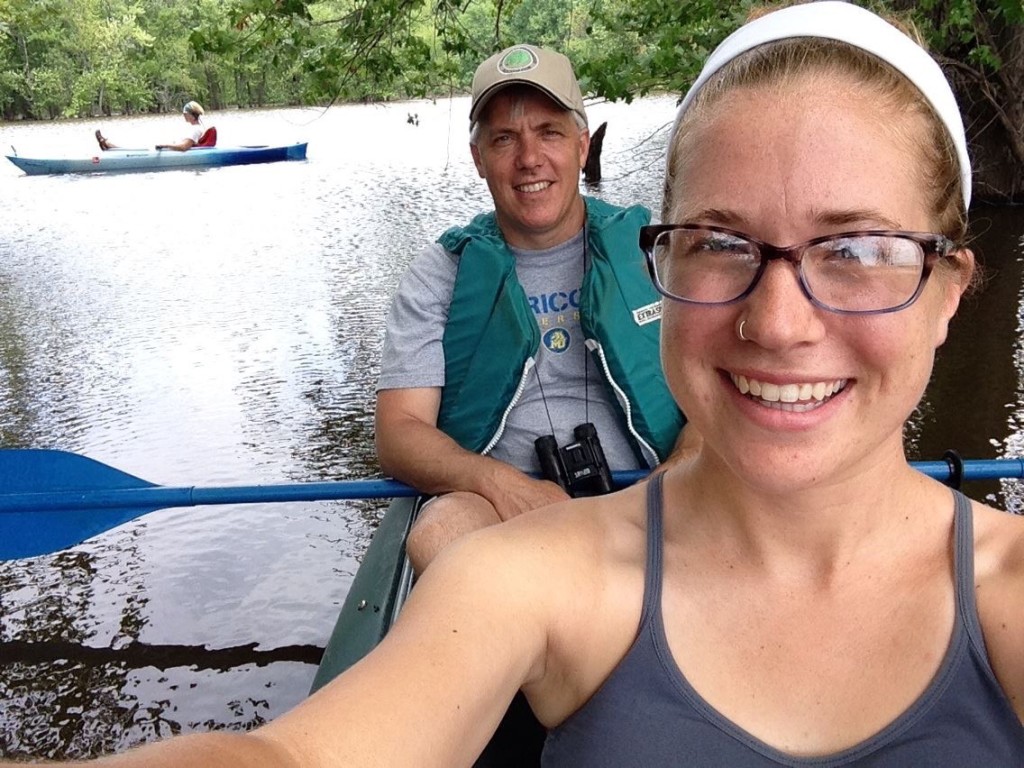
Steve on the Mississippi River near Hanover, Illinois, with his daughter Hannah. Steve’s wife, Susan, is in the background.
I think the other one had to do with my son Aaron’s death and grieving and healing and how that was connected to the land and how all that came together for me at Aaron’s Prairie (a piece of open land that Conserve Lake County came to own just north of Libertyville). It was a time when I felt dead spiritually, physically. That winter morning, you and other staff from Conserve and myself went out and spread prairie plant seeds on the ground as part of the restoration of the land back to natural habitat. I could barely walk from side to side because I was so physically spent. And just that metaphor of the prairie returning to what it used to be and my grief seeing that there was hope in those seeds – it was just a very powerful metaphor for my own healing. That was so human. That was you and me and Sarah and Tim and Cathy being a community with the land. That was a very meaningful group for me. It is still a deeply meaningful place for me. There was a very interesting whole connection of life there – the human, the spiritual, the land, the plants, the animals – that felt good at a time when I was lost.
Nathan: What you would like to see Christians do in their lives and through their churches to be better stewards of God’s earth?
Steve: You can’t be stewards of God’s earth unless you understand you’re stewards of God’s earth.
I went up to this program at Sinsinawa, a Dominican Sister’s place in Wisconsin. It’s on a geologic mound called Sinsinawa Mound. It stands out from the landscape. It’s visible even from where we live in Illinois. They were doing a series on contemplative ecology, and the first workshop was just reading and reflection during a full-day retreat. One activity involved eight short readings – each a paragraph long – and you were supposed to walk around and read each selection, silently but with the group. You were then to write your reflections in your journal. And one of the readings was about stewardship not being enough, that thinking of ourselves as stewards of God’s Creation is custodial rather than an all-in commitment. It made me start thinking about that word “stewardship.” Is it full enough? And I don’t think it is.
So I’ll end with this. A lot of the Dominican sisters come to this place called Sinsinawa. They’re women in their retired years who have lived a life of service, who are very liberal thinkers, who openly question the Catholic Church at every turn, who are progressive people. If I could go to church like the two experiences I’ve had there, that would be wonderful. There’s this huge, round, beautiful church building. It’s interestingly designed. There’s also a really interesting mix of people grounded in faith, people open to questioning their faith, people who are committed to the environment, people who are committed to art and literature and music. One of the things they did before I went to this class was they spent four weeks looking at Pope Francis’ encyclical on the environment. That milieu felt right for me.
But I don’t think I’ve answered your question.
Nathan: Not really, but I think I can find a question that that would be the answer for. (Laughter) Is there anything you’d encourage Christians to do?
Steve: Get involved with the land. Start a garden. Help restore a piece of land. I think that’s a start. Get your hands in the earth.

